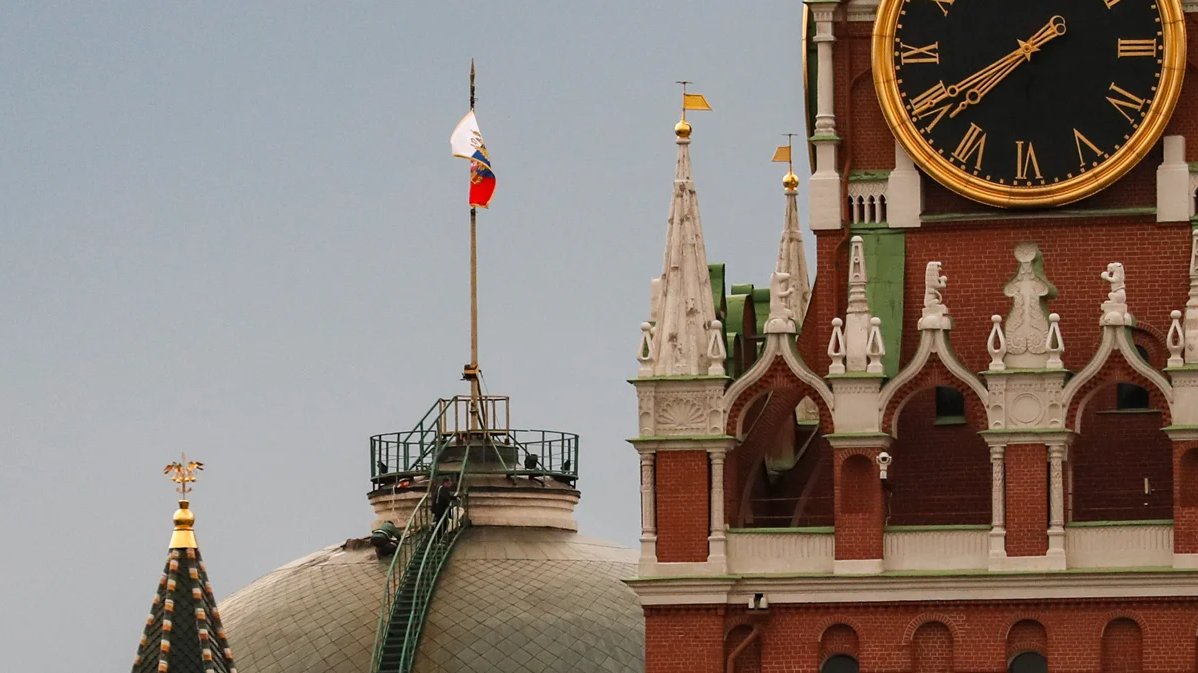The past year has been a momentous one in Russian news and a disastrous one for Russian society. Not only has the country spent the entire year at war, it also saw the first ever armed uprising against Vladimir Putin’s rule, followed two months later by a plane crash that eliminated the entire leadership of the Wagner Group, the entity that dared to challenge Kremlin rule.
This was also the year that the Kremlin came under attack by drones, the Wall Street Journal’s Moscow correspondent was arrested for spying, Kim Jong Un became one of the few world leaders who could stomach giving public support to Moscow, and the apparently indiscriminate bombing of civilians in Ukraine continued much as it did in 2022.
Entering 2024, the criminal war in Ukraine continues to claim lives each day, while in Russia the scale of political repression has reached levels not seen since the worst days of communism. Here’s a look back at some of the key events in Russia’s year.
January
On 14 January, a Russian missile hit a nine-storey residential building in the Ukrainian city of Dnipro. The strike, which destroyed an entire section of the building from top to bottom, killed 46 people, including six children, and injured over 80 others. One of the deadliest attacks of the war to date, only a missile strike on an apartment building in the Ukrainian city of Chasiv Yar in 2022 claimed more lives.
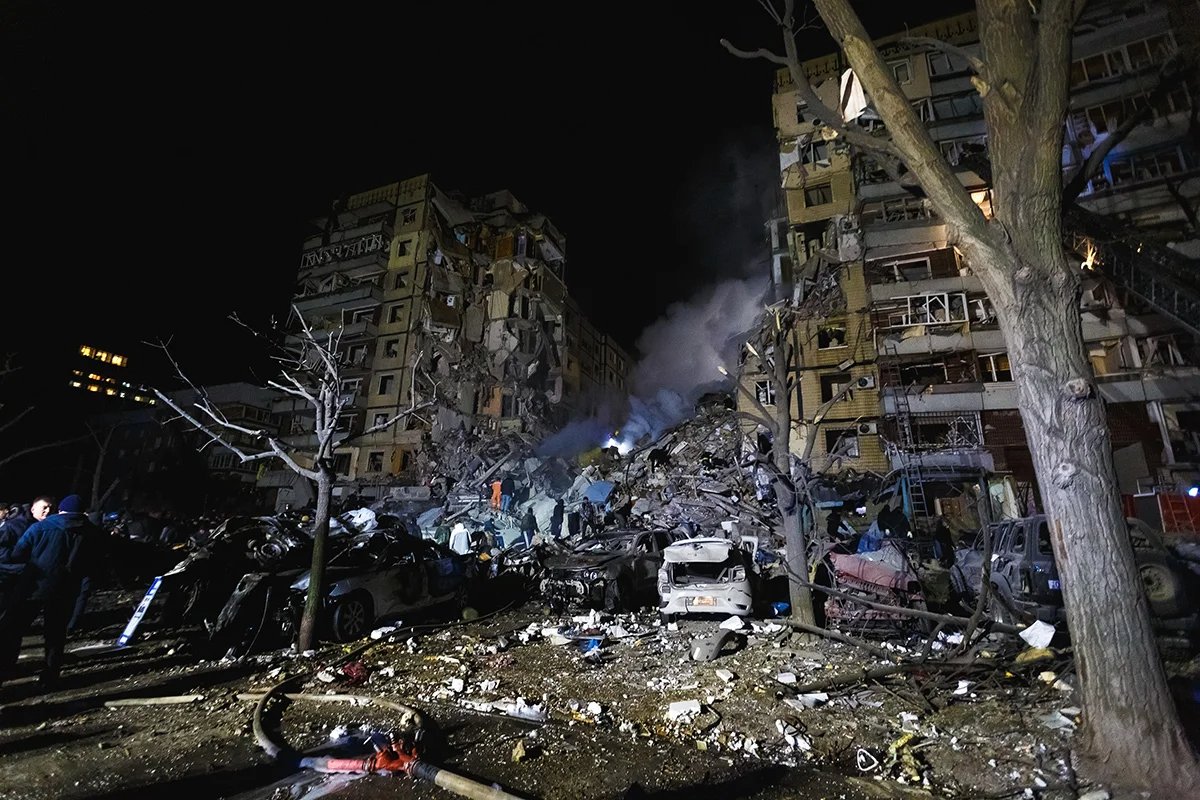
An apartment building reduced to rubble in the immediate aftermath of the Dnipro attack. Photo: Yuri Stefanyak / Global Images Ukraine / Getty Images
February
On the eve of the first anniversary of his invasion of Ukraine, Russian President Vladimir Putin made a rare public appearance in front of a largely bussed-in crowd of civil servants and other state employees at Moscow’s Luzhniki Stadium on 22 February to mark Defender of the Fatherland Day. Telling the 200,000-strong crowd that Russia was fighting for its “historic lands”, Putin led the crowd in chants of “Russia!” and seemed visibly buoyed by the event.
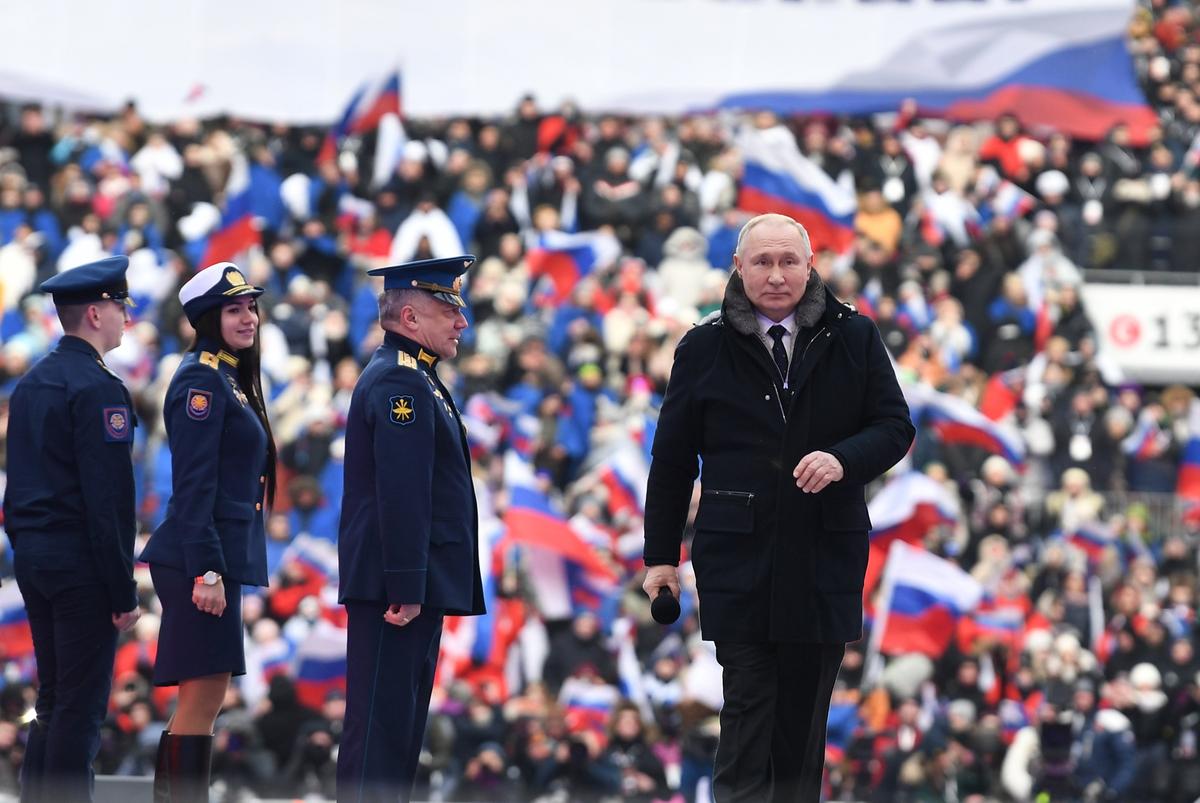
Russian President Vladimir Putin attends a rally at Moscow’s Luzhniki Stadium to mark Defender of the Fatherland Day on 22 February 2023. Photo: EPA-EFE / MAXIM BLINOV / SPUTNIK / KREMLIN POOL
March
The International Criminal Court (ICC) issued an arrest warrant for Russian President Vladimir Putin and his Commissioner for Children’s Rights Maria Lvova-Belova on 17 March for the illegal deportation of children from Russian-occupied areas of Ukraine to “camps” in Crimea. Russian troops also reportedly transferred 108 Ukrainian orphans between the ages of 5 and 16 to foster parents in Russia, an act that the ICC described as a war crime.
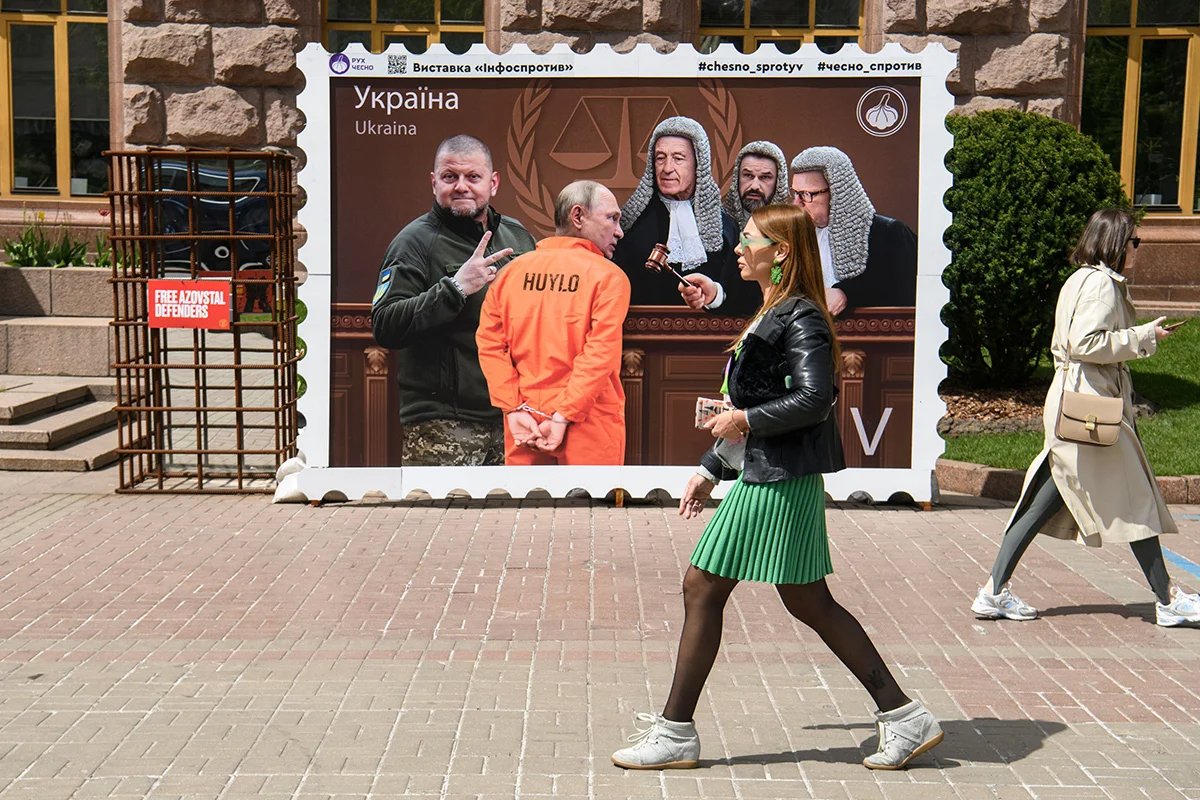
A poster in central Kyiv depicts Putin being tried for war crimes in the Hague, with "cocksucker" written on his prison uniform. Photo: Maxim Marusenko / NurPhoto / Shutterstock / Vida Press.
April
The assassination of Russian ultranationalist blogger Vladlen Tatarsky during a public meeting of a nationalist discussion group at a St. Petersburg café on 3 April shocked Russia. Tatarsky was killed by an explosive device hidden inside a statuette that had been brought to him as a “present” by 26-year-old Darya Trepova, who is in pre-trial detention awaiting trial on terrorism charges.
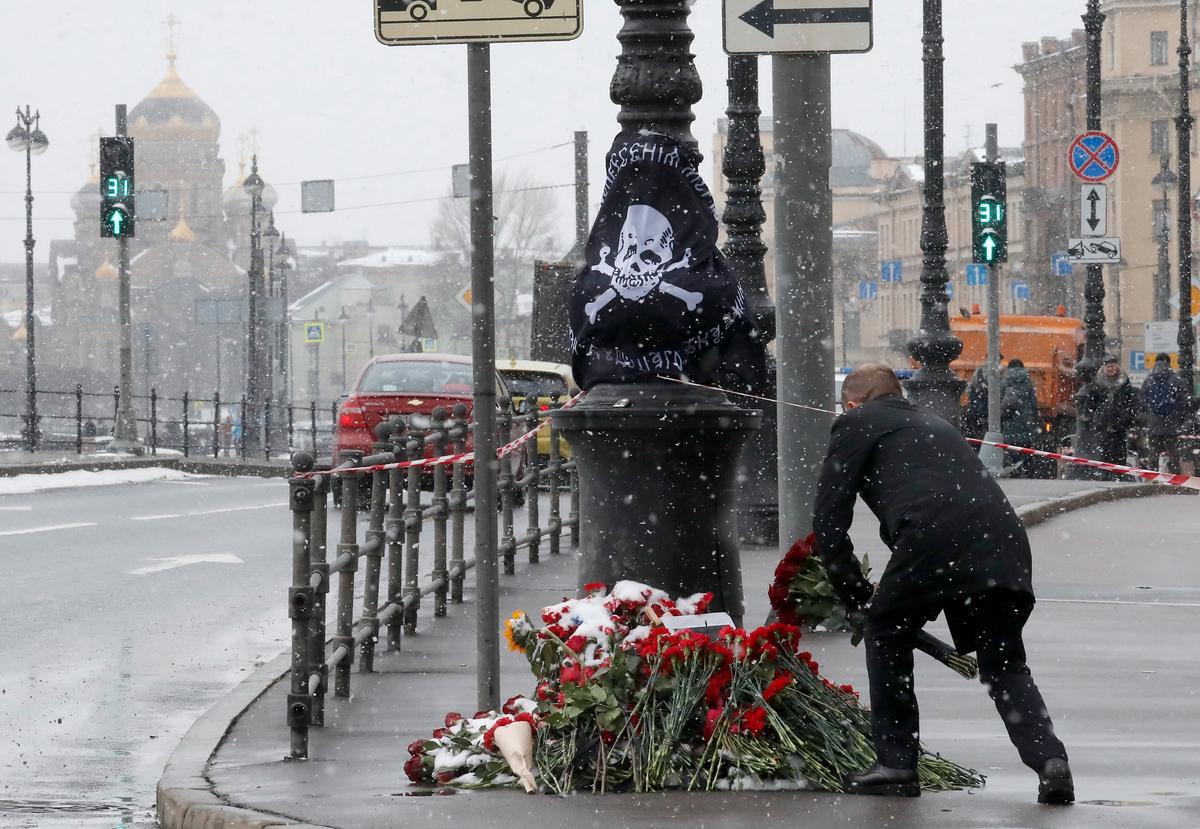
A man lays flowers in memory of assassinated Russian military blogger Vladlen Tatarsky in St. Petersburg on 3 April 2023. Photo: EPA-EFE / ANATOLY MALTSEV
May
A drone strike on the Kremlin — the very image of Russian might — on 3 May was a huge propaganda victory for Ukraine, though Kyiv subsequently denied that it had anything to do with the attack. Indeed, analysts at the US-based Institute for the Study of War concluded that the attack was likely staged by Russia. Vladimir Putin himself was not present at the time of the attack, his spokesperson later said.
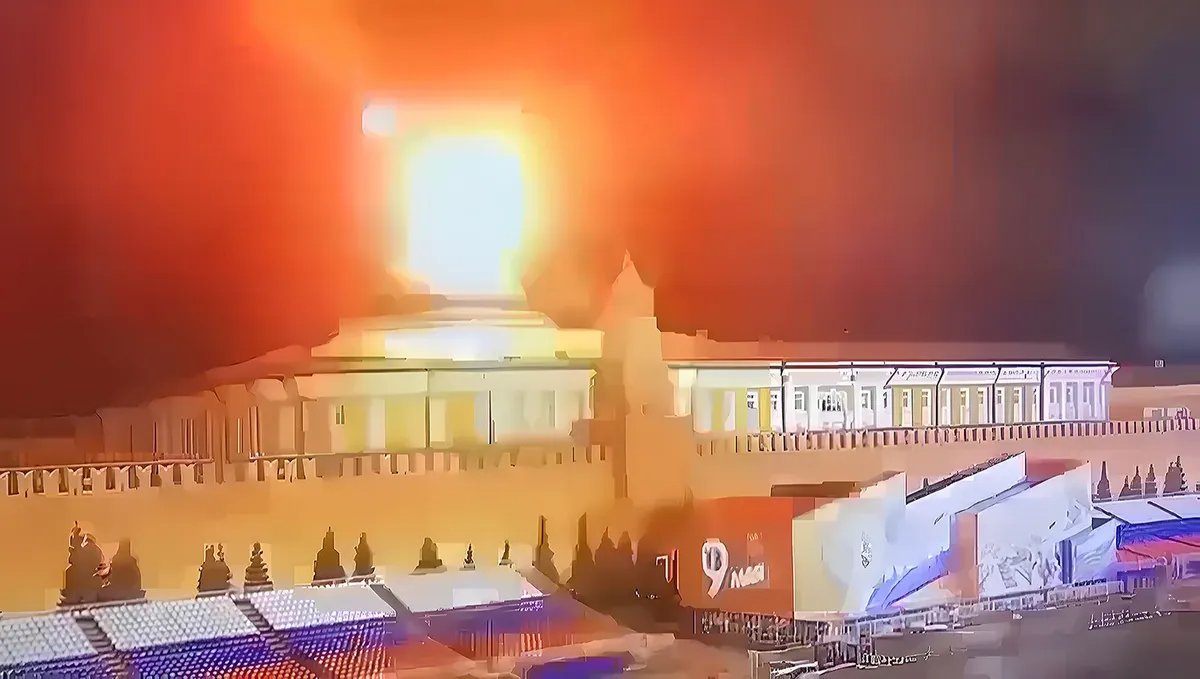
CCTV footage shows flames and smoke over the Kremlin following the drone attack on Russia's historic seat of power. Photo: CCTV cameras on Red Square / UPI / Shutterstock / Vida Press
June
When a long-running dispute between the Wagner Group and Russia’s Defence Ministry spilled over into the ill-fated Wagner Mutiny of 23-24 June, the entire world watched with bated breath as it appeared that Putin’s long reign was suddenly facing an existential threat. Wagner Group founder Yevgeny Prigozhin and his troops took control of the city of Rostov-on-Don and began marching on Moscow, only for Belarusian President Alexander Lukashenko to announce shortly afterwards that he had negotiated a peaceful resolution, which would see the criminal case against Prigozhin dropped and his departure for Belarus.
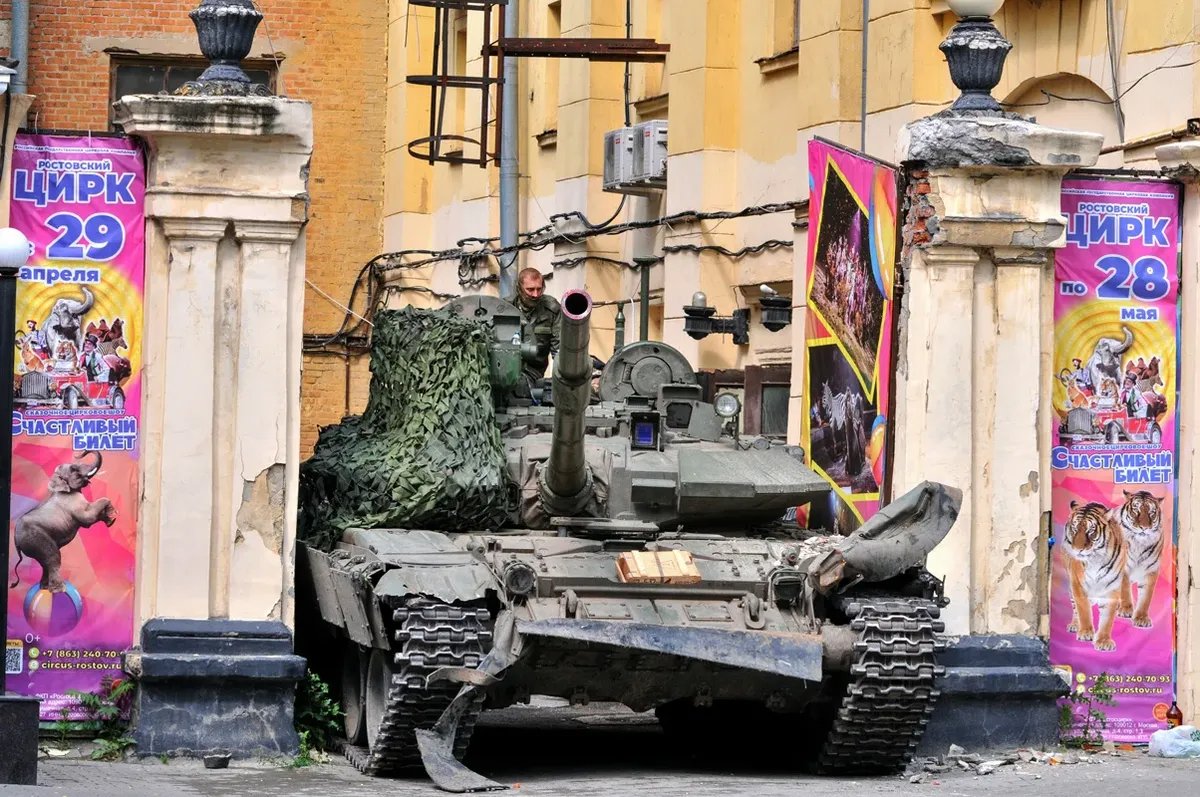
Wagner servicemen block a street in the centre of Rostov-on-Don on 24 June. Photo: Arkady Budnitsky / EPA-EFE
July
Ukrainian President Volodymyr Zelensky’s promise to bring the war to Russia continued to ramp up in July when drones struck Moscow-City, the Russian capital’s main business district. While there were no casualties and no serious damage, the strike once again made the point that Russians could not pretend the war wasn’t happening and was considered an important psychological victory for Kyiv.
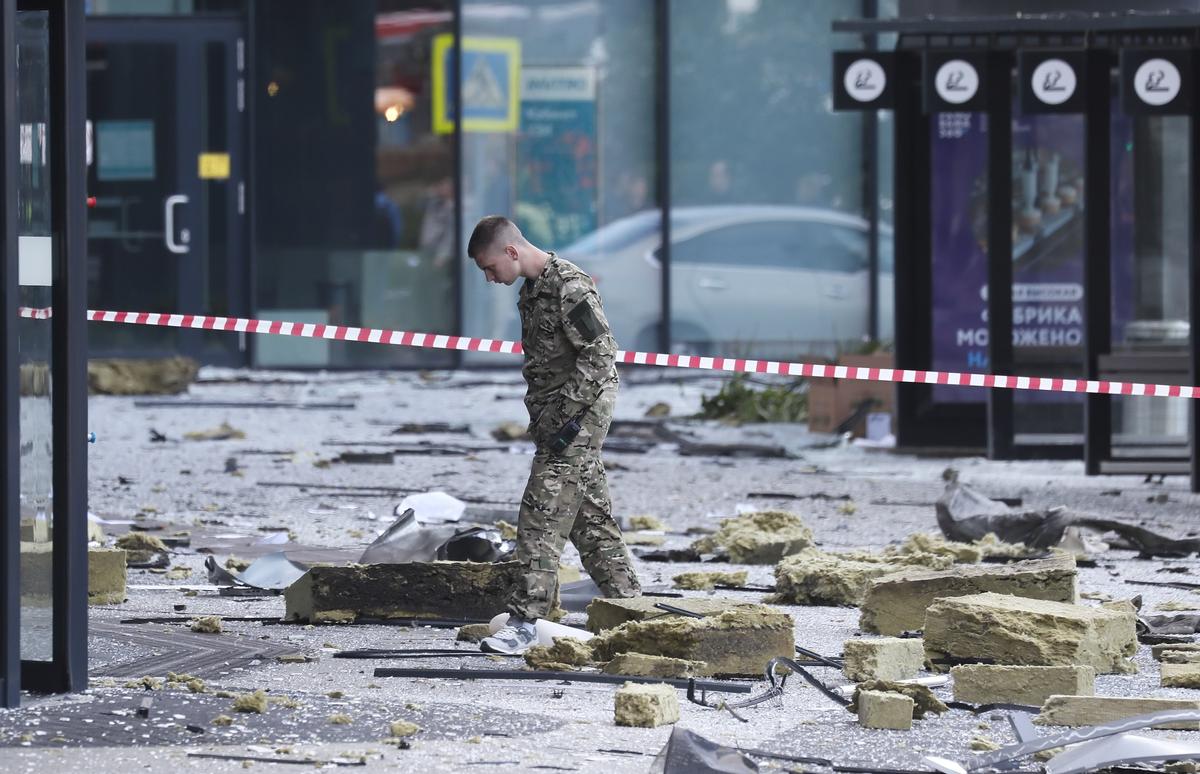
Inspecting the site of a damaged building in the Moscow-City business centre following a Ukrainian drone attack in Moscow on 30 July 2023. Photo: EPA-EFE/YURI KOCHETKOV
August
On 23 August, a plane crash in the Tver region killed 10 people, including Wagner Group founder Yevgeny Prigozhin and two of the mercenary organisation’s most senior commanders, Dmitry Utkin and Valery Chekalov. Prigozhin was buried in his native St. Petersburg with a large security operation in place to ensure that the ceremony didn’t become a rallying point for anti-government protests.
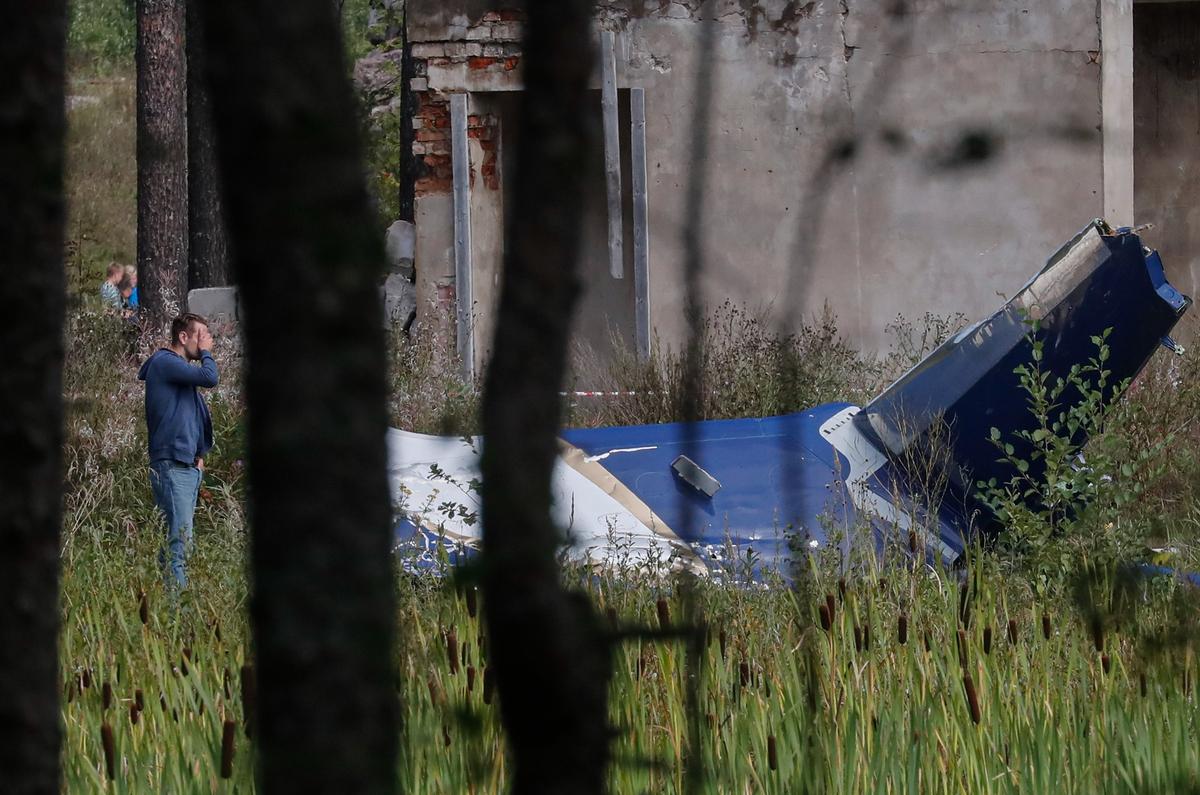
A man looks at the wreckage of the plane that was carrying Yevgeny Prigozhin near the village of Kuzhenkino, in the Tver region, on 24 August 2023. Photo: EPA-EFE / ANATOLY MALTSEV
September
An increasingly isolated Russia was forced to turn to North Korean dictator Kim Jong Un for military assistance as it ran low on artillery shells in September. Travelling by train to the Russian Far East, Kim met with Vladimir Putin at Vostochny Cosmodrome, Russia’s main spaceport, on 13 September. However, the highlight of Kim’s visit appeared to be his tour of Vladivostok’s oceanarium, where he watched performances by beluga whales, bottlenose dolphins, and Misha the walrus, which, according to Russian media reports, he seemed particularly taken by.
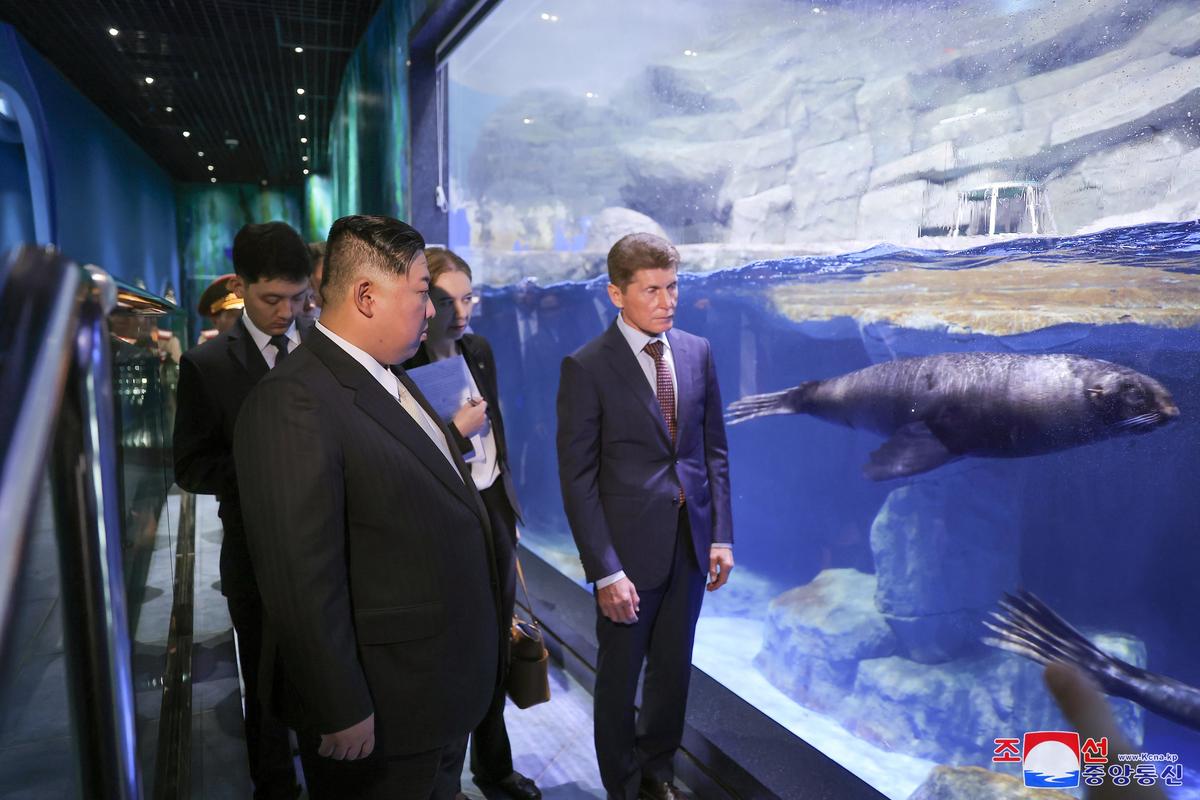
North Korean leader Kim Jong Un during a visit to Primorsky Oceanarium in Vladivostok on 17 September 2023. Photo: EPA-EFE/KCNA
October
On 10 October, a Moscow court rejected Wall Street Journal correspondent Evan Gershkovich’s appeal against the extension of his pre-trial detention on espionage charges. Gershkovich, a US citizen, was detained in Yekaterinburg on 31 March and has been in custody ever since. The United States has determined Gershkovich to have been “wrongfully detained” — an official designation that opens the door to a potential prisoner exchange.
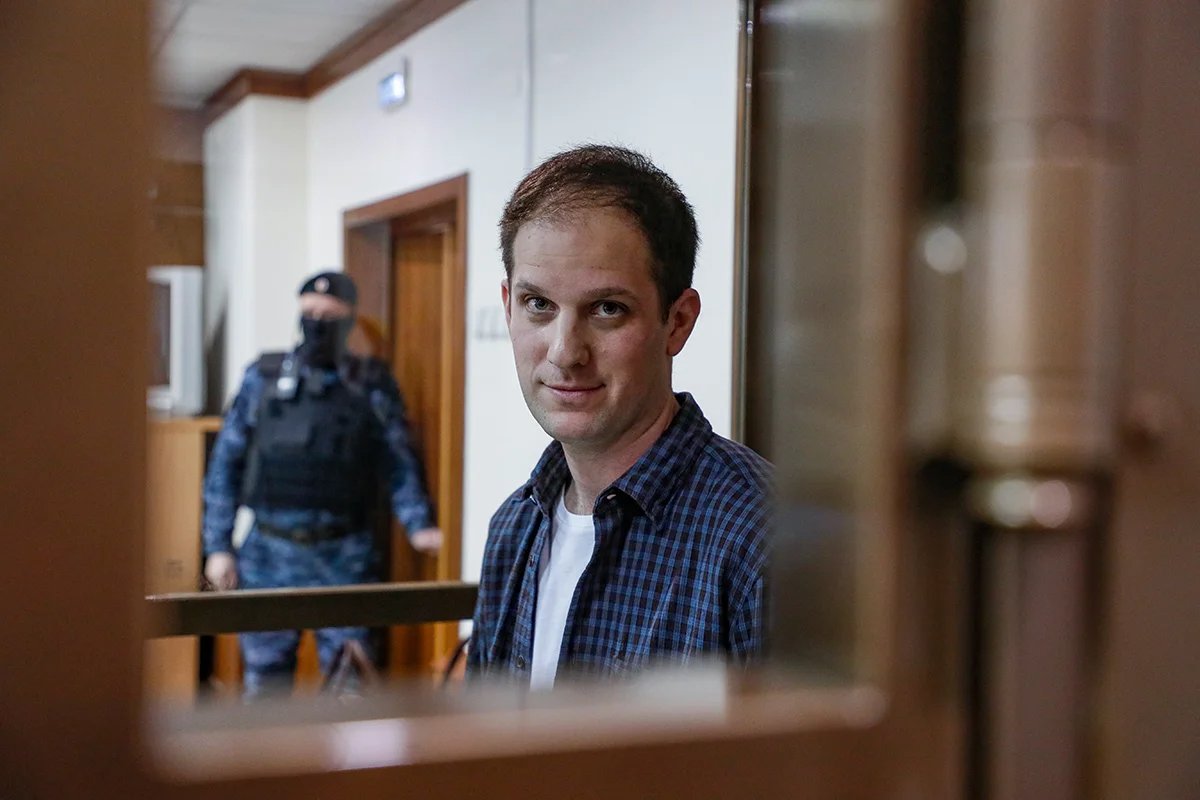
Evan Gershkovich appears in a Moscow court during his appeal hearing on 10 October 2023. Photo: Yuri Kochetkov / EPA-EFE
November
On 16 November, St. Peterburg artist Sasha Skochilenko was sentenced to seven years in prison for disseminating “falsehoods” about the Russian army. Skochilenko had replaced the price tags in her local supermarket with anti-war messages in the weeks following the Russian invasion of Ukraine, and had been in pre-trial detention for over a year before her trial, despite multiple chronic health issues.
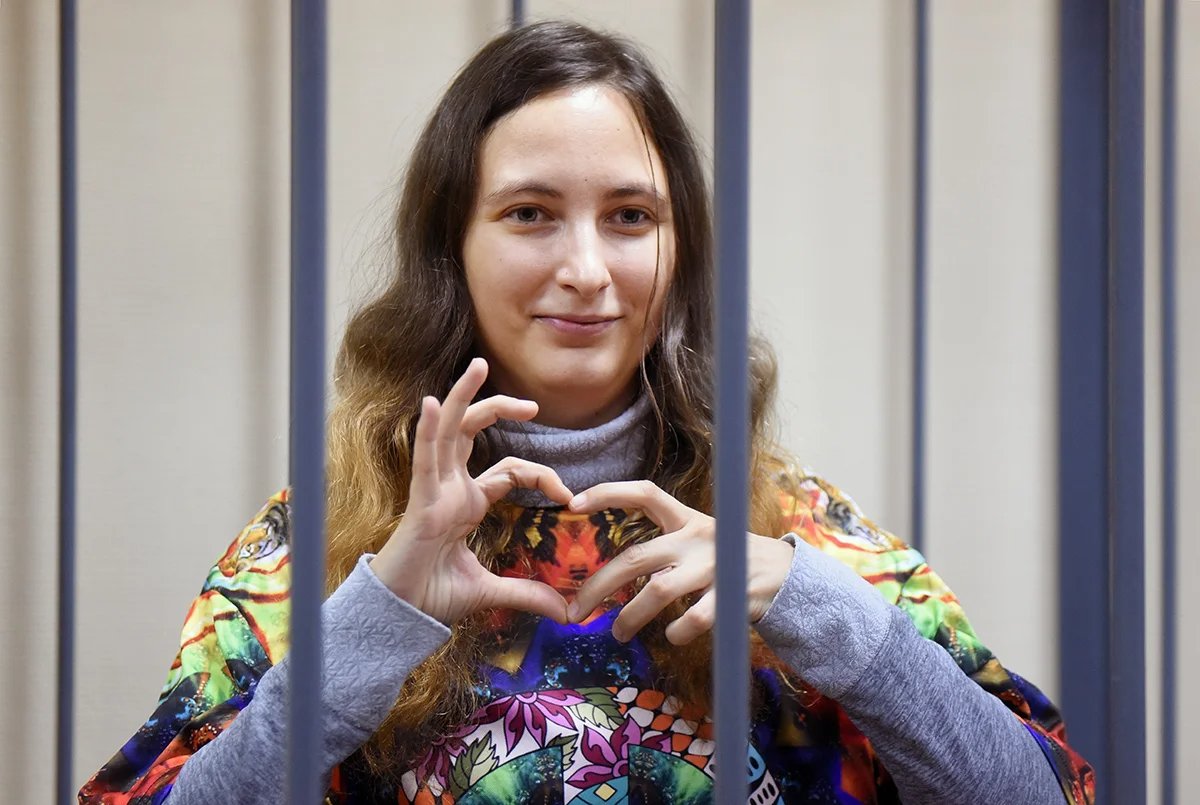
Skochilenko at her trial in St. Petersburg in November. Photo: Alexander Koryakov / Kommersant / Sipa USA / Vida Press
December
On 14 December Putin returned to his tried and trusted format of choreographed praise, scripted questions and vetted audience members in his annual Direct Line call-in show, to which his annual press conference for foreign correspondents was added. The event effectively kicked off the Russian presidential election campaign, with elections due on 17 March 2024.
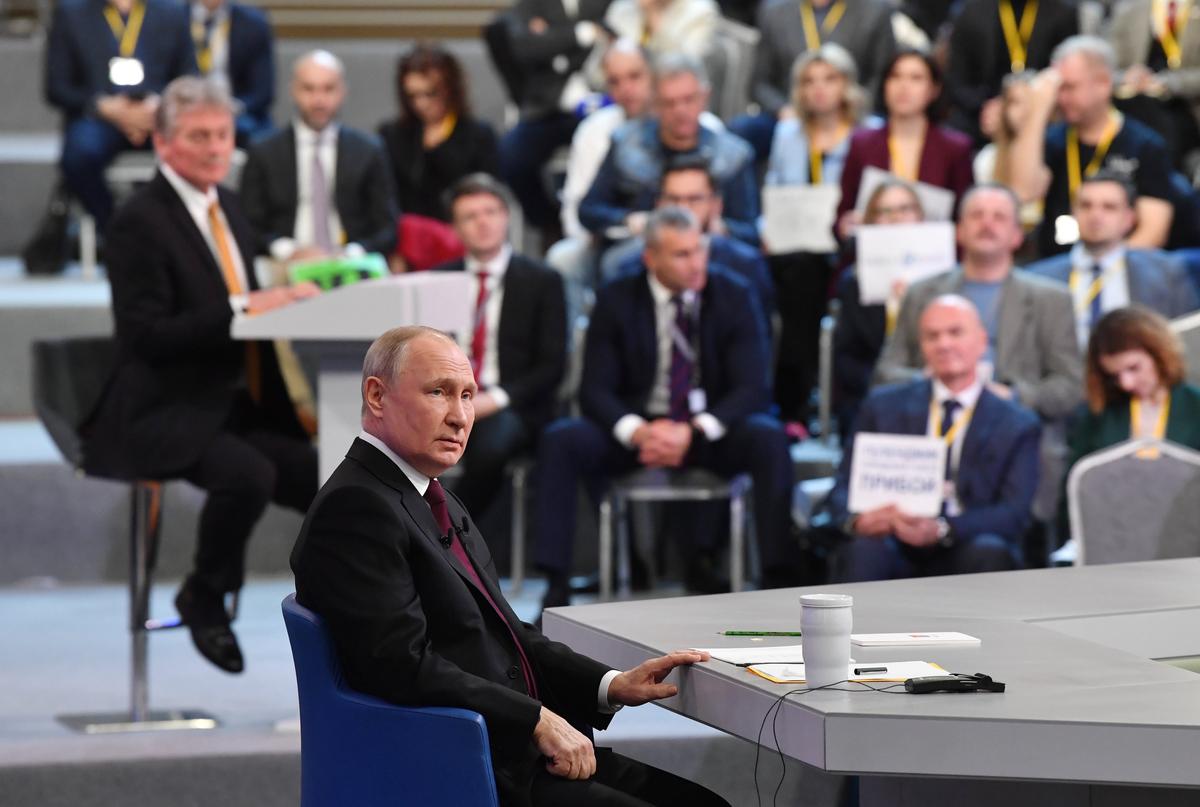
Russian President Vladimir Putin holds his annual Direct Line call-in show and press conference in Moscow on 14 December 2023. Photo: EPA-EFE / ALEXANDER KAZAKOV / SPUTNIK / KREMLIN POOL
Join us in rebuilding Novaya Gazeta Europe
The Russian government has banned independent media. We were forced to leave our country in order to keep doing our job, telling our readers about what is going on Russia, Ukraine and Europe.
We will continue fighting against warfare and dictatorship. We believe that freedom of speech is the most efficient antidote against tyranny. Support us financially to help us fight for peace and freedom.
By clicking the Support button, you agree to the processing of your personal data.
To cancel a regular donation, please write to [email protected]
